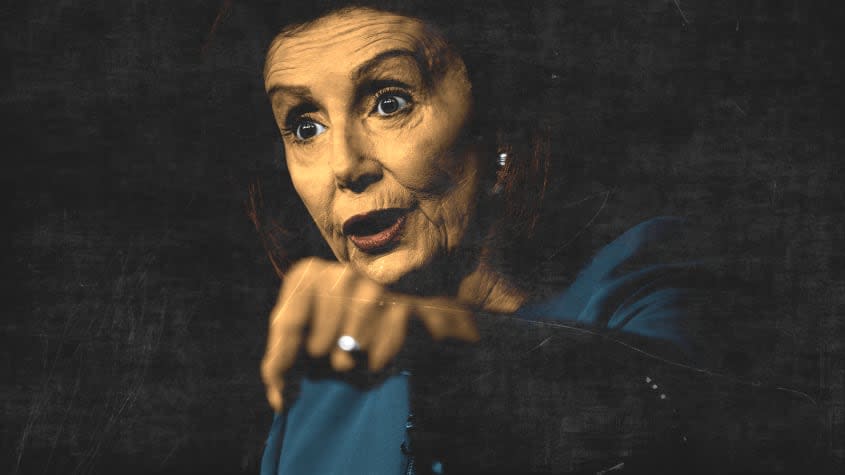The Democrats' grab-bag approach to budget reconciliation could cost them everything

- Oops!Something went wrong.Please try again later.
One of the biggest problems for congressional Democrats these days is that they haven't really set any priorities. They're trying to do everything at once.
Consider a partial list of what the party is trying — or has tried — to fit into the ever-evolving budget reconciliation proposal: Tax increases on corporations and the wealthy. Climate policy. Immigration reform. Paid family and medical leave. Improvements to Medicare, Medicaid, and ObamaCare. Universal pre-K and child care for working families. Making the Child Tax Credit payments permanent. Free community college tuition. Affordable housing.
That's a lot of stuff.
Each of the provisions is perfectly defensible, even laudable. But by cramming all of them together, Democrats have created a branding problem for themselves. The reconciliation package is defined more by its $3.5 trillion price tag than for any particular good it might accomplish in the lives of American voters. That has made it a nice fat target both for Republicans, and for Democratic moderates like Sens. Joe Manchin (D-W.Va.) and Krysten Sinema (D-Ariz.) who are looking to score points by trimming their own party's sails. Over the last week or so, some progressives — and the White House — have started to make the case that the overall proposal isn't actually all that expensive. They're fighting an uphill battle, and it's clear that the entire Democratic agenda is in danger of collapsing due to party infighting. House Speaker Nancy Pelosi has a formidable history as a legislator, but the process of bringing her party together on reconciliation might be one of the most difficult things she's ever done.
"Let's not talk about numbers and dollars," Pelosi said Sunday. "Let's talk about values."
That's a good pitch, but her challenge is obvious. When you try to accomplish everything at once, it's possible to fail at everything at once.
It's easy to imagine a more effective process, one that breaks the current giant proposal into smaller, more palatable parts and tries to legislate them one by one. Pass a paid leave bill. And then a tuition bill. And then a child tax credit bill, and so on. That might be more cumbersome for Congress, requiring members to negotiate over dozens of bills instead of just one. But an incremental process would have the benefit of resiliency: Even if one proposal failed, another could still pass. Currently, it's all or nothing. The modest approach might also reduce the heartburn for self-proclaimed fiscal watchdogs like Manchin; programs that individually cost billions of dollars over 10 years would probably be easier to swallow than one giant package with "trillion" in the label. It would also solve the branding problem. Voters can more easily understand what you've accomplished for them when you pass, say, a Medicare dental bill than if that bill is just one small benefit in a much larger grab bag of goodies. In politics, simplicity often has its virtues.
So why don't Democrats do a bunch of smaller, easier things rather than one big, difficult thing? There are a couple of reasons. Timing is one of them: The party's majorities are narrow in both the House and Senate, and the president's party usually loses seats during the midterm elections. Pelosi and Senate Majority Leader Chuck Schumer (D-N.Y.) know this might be their party's last bite at the apple for the next few years. There is an urgency to get stuff done now.
As always, though, the filibuster is the biggest factor. The Senate has a de facto 60-vote requirement to pass most legislation — a tough hurdle when Democrats have just 50 votes, plus the vice president's tie-breaker. Budget items can be passed on a straight majority through the reconciliation process, but there are only a couple of opportunities for reconciliation in any given year. Democrats don't have much choice but to tackle everything on their agenda all at once, though sometimes that means stretching a bit — immigration reform isn't really a fiscal matter, but that didn't stop Dems from trying (and failing) to include it in reconciliation.
What would the Democratic agenda look like if the filibuster were broken and leaders had more leeway to choose which priorities to advance, and when? I'd personally start with reforming the Electoral Count Act, and follow up with a climate bill. Others might choose to prioritize police reform or child-care spending.
Some battles would be won. Some battles would be lost. Those smaller losses would be easier to absorb, however. Under the current rules, there's a real chance the party will fall apart on the reconciliation bill — and perhaps take the bipartisan infrastructure bill with it. Going big, even if it's the only real choice, makes it more likely Democrats could lose everything.
You may also like
7 painfully funny cartoons about America's endless vaccine fights
Democrats are governing like Republicans
How America's shredding of international law enabled the Tigray crisis

